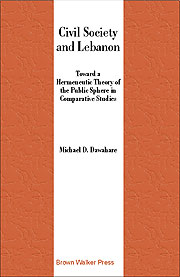
Civil Society and Lebanon
Toward a Hermeneutic Theory of the Public Sphere in Comparative Studies
by Michael D. Dawahare
- Number of Pages: 165
- ISBN-10: 1581124007
- ISBN-13: 9781581124002
- Publisher: BrownWalker Press
- Year: 2000
- Category: Social Science, Political Science
Synopsis
This study pursues a hermeneutic and dialogic conception of the public sphere. Through a critical assessment of the development of the closely related ideas of civil society and a democratic public sphere. Specifically, this study explores Ibn Khaldoun's notion of Asabiya and its impact on the constitution of civil society and the public sphere in Lebanon, paying particular attention to the notions of power and authority within the context of this indigenous concept in particular, and Lebanese (and Arab) culture in general."Professor Dawahare has applied a set of complex theories to the Lebanese situation, and the result has been to better explain Lebanese politics as well as to probe new theoretical terrain. The study is comprehensive and represents a better use of theory to produce insights into one of the most complex political systems in the Middle East region than many other recent works on the subject. This book will be of interest to both social theorists and Middle East Scholars."
John D. Stempel, Director, The Patterson School of Diplomacy and International Commerce, University of Kentucky



 View or Post a Review at Amazon.com
View or Post a Review at Amazon.com